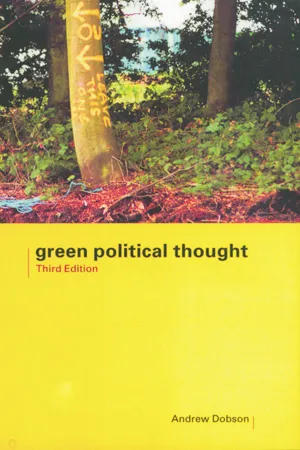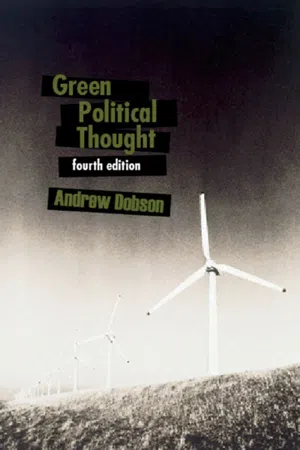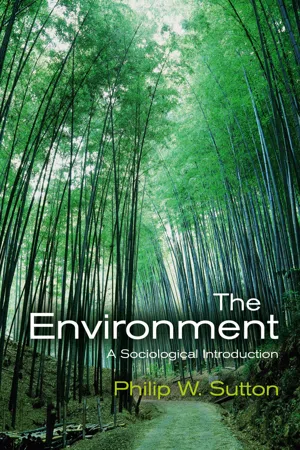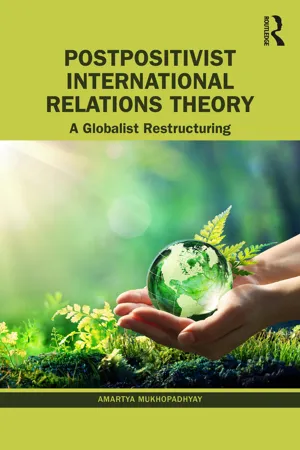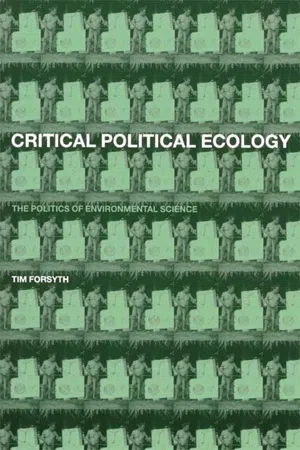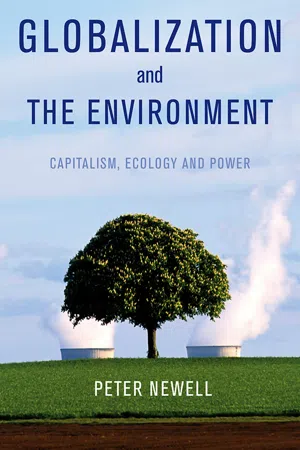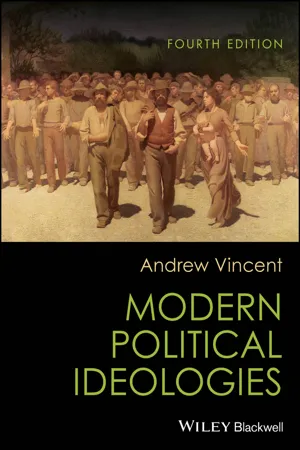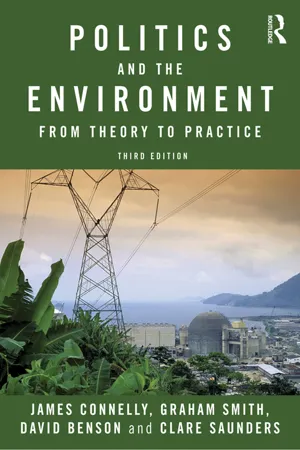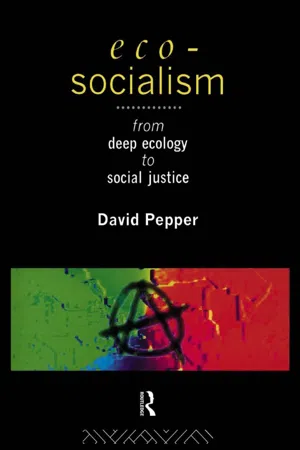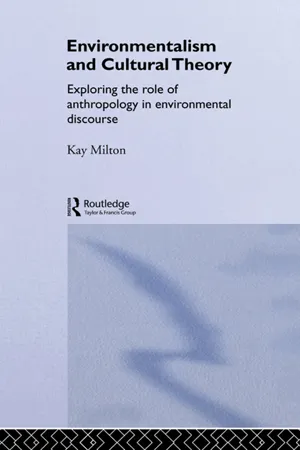Politics & International Relations
Ecologism
Ecologism is a political ideology that emphasizes the importance of ecological sustainability and the interconnectedness of all living things. It seeks to address environmental issues through policies that prioritize conservation, renewable energy, and sustainable development. Ecologism also advocates for a shift away from consumerism and promotes a more harmonious relationship between humans and the natural world.
Written by Perlego with AI-assistance
Related key terms
10 Key excerpts on "Ecologism"
- eBook - ePub
- Andrew Dobson(Author)
- 2012(Publication Date)
- Routledge(Publisher)
ConclusionWe have established the differences between Ecologism and other major political ideologies, and the incompatibility between what I have called environmentalism and Ecologism is now clear. Ecologism seeks radically to call into question a whole series of political, economic and social practices in a way that environmentalism does not. Ecologism envisages a post-industrial future that is quite distinct from that with which we are most generally acquainted. While most post-industrial futures revolve around high-growth, high-technology, expanding services, greater leisure, and satisfaction conceived in material terms, Ecologism’s post-industrial society questions growth and technology, and suggests that the Good Life will involve more work and fewer material objects. Fundamentally, Ecologism takes seriously the universal condition of the finitude of the planet and asks what kinds of political, economic and social practices are (a) possible and (b) desirable within that framework. Environmentalism, typically, does no such thing.In terms of human relationships with the non-human natural world, Ecologism asks that the onus of justification be shifted from those who counsel as little inference as possible with the non-human natural world to those who believe that interference is essentially non-problematic. Environmentalists will usually be concerned about intervention only as far as it might affect human beings; ecologists will argue that the strong anthropocentrism that this betrays is far more a part of our current problems than a solution to them.Practical considerations of limits to growth and ethical concerns about the non-human natural world combine to produce, in Ecologism, a political ideology in its own right. We can call it an ideology (in the functional sense) because it has, first, a description of the political and social world – a pair of green spectacles – which helps us to find our way around it. It also has a programme for political change and, crucially, it has a picture of the kind of society that ecologists think we ought to inhabit – loosely described as the ‘sustainable society’. Because the descriptive and prescriptive elements in the political-ecological programme cannot be accommodated within other political ideologies (such as socialism) without substantially changing them, we are surely entitled to set Ecologism alongside such ideologies, competing with them in the late twentieth-century political market-place. In contrast, I maintain that the various sorts of environmentalism (conservation, pollution control, waste recycling, etc.) can be slotted with relative ease into more well-known ideological paradigms, and that the way these issues have been readily taken up right across the political spectrum shows this co-option at work. - eBook - ePub
- Andrew Dobson(Author)
- 2007(Publication Date)
- Routledge(Publisher)
Conclusion
We have established the differences between Ecologism and other major political ideologies, and the incompatibility between what I have called environmentalism and Ecologism is now clear. Ecologism seeks radically to call into question a whole series of political, economic and social practices in a way that environmentalism does not. Ecologism envisages a post-industrial future quite distinct from that with which we are most generally acquainted. While most post-industrial futures revolve around high-growth, high-technology, expanding services, greater leisure, and satisfaction conceived in material terms, Ecologism’s post-industrial society questions growth and technology, and suggests that the Good Life will involve more work and fewer material objects. Fundamentally, Ecologism takes seriously the universal condition of the finitude of the planet and asks what kinds of political, economic and social practices are (1) possible and (2) desirable within that framework. Environmentalism, typically, does no such thing.In terms of human relationships with the non-human natural world, Ecologism asks that the onus of justification be shifted from those who argue that the non-human natural world should be given political voice to those who think it should not. Environmentalists will usually be concerned about ‘nature’ only so far as it might affect human beings; ecologists will argue that the strong anthropocentrism this betrays is more a part of our current problems than a solution to them.Practical considerations of limits to growth and ethical concerns about the non-human natural world combine to produce, in Ecologism, a political ideology in its own right. We can call it an ideology (in the functional sense) because it has, first, a description of the political and social world – a pair of green spectacles – which helps us to find our way around it. It also has a programme for political change and, crucially, it has a picture of the kind of society that ecologists think we ought to inhabit – loosely described as the ‘sustainable society’. Because the descriptive and prescriptive elements in the political-ecological programme cannot be accommodated within other political ideologies (such as socialism) without substantially changing them, we are surely entitled to set Ecologism alongside such ideologies, competing with them in the late twentieth-century political marketplace. In contrast, I maintain that the various sorts of environmentalism (conservation, pollution control, waste recycling) can be slotted with relative ease into more well-known ideological paradigms, and that the way these issues have been readily taken up right across the political spectrum shows this co-option at work. - eBook - ePub
The Environment
A Sociological Introduction
- Philip W. Sutton(Author)
- 2013(Publication Date)
- Polity(Publisher)
ism. Political ideologies always present a diagnosis of society’s current problems, a set of solutions to those problems and a strategy for getting from here to there. Ecologism does exactly this in relation to the society–nature relationship and the solving of environmental problems. So, Ecologism says that there is a looming environmental crisis that needs to be solved and that doing so will need some quite radical changes to the social structuring of life. Greens of course have ideas on how this restructuring could be achieved. The emergence of such a ‘political ecology’ reflects the fact that the natural environment has become politicized to a much greater degree than in previous decades.Ulrich Beck has made the point that environmental issues have become increasingly significant because nature has emerged as a political issue as awareness has grown that the hard and firm distinction between nature and society is being eroded. It is not that there is no real nature any more, but just that those things we previously thought of as ‘natural’ and therefore outside of human society are now coming to be seen as part of society itself. Take the genetic modification (GM) of crops. Scientists are now able to manipulate the genetic structure of natural species to make them more productive or resistant to disease. After being manipulated by people, are such crops and foods still a part of nature, or not? Certainly, environmental campaigns in Europe have targeted and destroyed GM crops as being ‘unnatural’ things that threaten to interfere with nearby ‘natural’ organic crops. But perhaps the right answer is that they are a bit of both. GM crops are part natural and part social. Anthony Giddens puts this a different way. He argues: ‘Nature has become socialized. Today, among all the other endings, we may speak in a real sense of the end of nature – a way of referring to its thoroughgoing socialization’ (1994: 77). The dividing line between the ‘natural’ and the ‘social’ has become increasingly blurred. The environmentalist writer Bill McKibben makes a similar point. He says that the effects of industrial production are now so strong that ‘[a] child born now will never know a natural summer, a natural autumn, winter or spring. Summer is going extinct, replaced by something else that will be called “summer”’ (1990: 55). What he means by this is that the timing of the seasons is changing, as are the weather patterns that characterize them. Human societies are changing the cycles and processes of nature but, and this is an important point, they are not exerting control over them. These changes are unplanned, uncontrolled and for many people actually quite unsettling. Environmental issues are therefore one important source of that emerging ‘risk society’ that Beck identified in the late 1980s (chapter 5 - eBook - ePub
Postpositivist International Relations Theory
A Globalist Restructuring
- Amartya Mukhopadhyay(Author)
- 2023(Publication Date)
- Routledge India(Publisher)
4ENVIRONMENTALISM TO GREEN THEORYPostpositivist Antistatism and Transnational TurnDOI: 10.4324/9781003451150-4Introduction: From Environmentalism to Ecologism and Green Theory, a Terminological Prelude
Green politics is the fourth chapter of our globalist paradigm and is one of the newest theoretical perspectives in IR. Currently, a distinction is made between ‘Environmentalism’ and ‘Green Politics’. To assess the worth of this distinction we need to know the exact meaning of the words environmentalism, Ecologism, and green theory and politics. Dobson says that environmentalism ‘argues for a managerial approach to environmental problems, secure in the belief that they can be solved without fundamental changes in present values or patterns of production and consumption’. But ‘Ecologism holds that a sustainable and fulfilling experience presupposes radical changes in our relationship non-human natural world, and in our mode of social and political life’.1 Paterson brings out the political difference between the two in an even clearer way:[E]nvironmentalists, broadly speaking, accept the framework of the existing political, social, economic and normative structures of world politics, and seek to ameliorate environmental problems within those structures, while Greens regard those structures as the main origin of the environmental crisis and therefore contend that they … need to be challenged and transcended.He, however, sounds a note of caution that this ‘obviously … crude simplification of the variety of positions adopted by those within the Green, and broader environmental movement’, is useful here only ‘as a representation of ideal types’.2But, even as ideal types, the distinction between the monikers of environmentalism and Ecologism has not always been sustained. While considering different alternative labels for ‘environmental political theory’ in their edited volume on it, such as ‘“Green” political thought (or theory)’, ‘political ecology’, ‘political theory of sustainability’, and so on, Gabrielson et al. have referred to the current argument that ‘green’ is a broader label than ‘environmental’, in more effectively betokening ‘the field’s expansive interest in the intersection of environmental concerns with those of social justice, non-violence, and the valuation of the non-human world for more than instrumental purposes’ even as the epithet ‘environmental political theory’ does no more imply the ‘mere application of already formed political theories to the “issue” of environment’. But they still retain the term to maintain the identity of the field from the positions and views of green political parties.3 In course of judging the relevance of the two terms in the context of is wider context of ‘interspecies’, Youatt points out that the import of shallowness and depth in these two terms is misleading. For, ‘shallow ecology is perfectly possible, as is deep environmentalism’.4 This point would be buttressed by the fact that Eckersley’s book on environmentalism and political theory stakes out an ‘ecocentric approach’ and starts with the impact of green parties on it from the fourth line of Chapter 1 5 while Carter’s book on the ‘politics of the environment’ speaks of key ingredients of ‘Green political thought’, the ‘anthropocentric and ecocentric divide’, ‘holistic perspectives’, ‘moral extensionism’, right from the ‘Introduction’, and second and third chapters of the book.6 Some explanation of why this is happening can be found in Mulvaney’s words that the understandings of Ecologism ‘can be grouped into two schools, known as “minimalist” and “maximalist”’. In the former approach, ‘the terms environmentalism and Ecologism are often used interchangeably’ and either ‘can be used as an umbrella term, encompassing a spectrum that runs from “light green” or “ecological modernization”, at one extreme and “dark green” or “deep ecology” at the other’, taking its roots, as suggested by Andrew Vincent, to the nineteenth century. In the latter, maximalist, approach, best represented by Dobson, a strict distinction between the two terms places the origins of Ecologism in more recent times.7 - eBook - ePub
Critical Political Ecology
The Politics of Environmental Science
- Timothy Forsyth(Author)
- 2004(Publication Date)
- Routledge(Publisher)
It is widely accepted that debates concerning “political ecology” refer to the social and political conditions surrounding the causes, experiences, and management of environmental problems (e.g. Blaikie and Brookfield, 1987; Bryant, 1992; Greenberg and Park, 1994; Zimmerer, 2000). It is, however, remarkable that much writing about political ecology does not define what is meant by “ecology.” A variety of authors over the years have revealed different approaches to the meaning of “ecology” in “political ecology.”First, some authors have approached political ecology by explaining environmental problems as the phenomenological interaction of biophysical processes, human needs, and wider political systems. Blaikie and Brookfield wrote:The phrase “political ecology” combines the concerns of ecology and a broadly defined political economy. Together this encompasses the constantly shifting dialectic between society and land-based resources, and also within classes and groups within society itself.(1987: 17)Second, there is the “politics of ecology” in the sense of political activism in favor of Deep Green environmentalism and its critique of modernity and capitalism. Atkinson wrote: “Political Ecology is both a set of theoretical propositions and ideas on the one hand and on the other a social movement referred to as the ‘ecology movement’ or, latterly, the Green movement” (1991: 18).Third, there is the use of “ecology” as a metaphor for the interconnectedness of political relations. This metaphor was adopted by the first book with “political ecology” in its title, International Regions and the International System: A Study in Political Ecology - eBook - ePub
Globalization and the Environment
Capitalism, Ecology and Power
- Pete Newell(Author)
- 2013(Publication Date)
- Polity(Publisher)
Political ecology is predicated on an ecologically conceptualised view of politics: it is attentive to the hard edges of capitalist accumulation and global flows of labour, capital and information, but also attuned to the complex operations of power-knowledge . . . all within a system prone to political-economic crisis (Peet et al. 2011: 23).It is a research agenda that coalesces around the impact of capitalist development on the environment, as well as its emergence through particular socio-natures. It centres both on the social and political implications of prevailing practices of environmental protection and management, and the political economy of the way ‘new natures’ are produced. Such lines of enquiry have been pursued through work on the practices of commodification of ‘neo-liberal natures’ (Castree 2003, 2008; Budds 2004; Mansfield 2004, 2007; Bakker 2005), as well as through ‘classic’ political ecology concerns with questions of access to material and natural resources, and issues of resistance, equity and justice in the negotiation and distribution of social and environmental benefits at multiple scales (Peluso 1992; Bryant and Bailey 1997; Paulson et al. 2003; Zimmerer and Bassett 2003).One strand of political ecology which developed in the wake of, and by way of response to, the Rio Earth summit in 1992 is that associated with the work of Wolfgang Sachs, Nicolas Hildyard, Vandana Shiva and others, which perhaps resonates most directly with the traditional preoccupations of International Relations (IR) scholars (Sachs 1993). Critical of the contents of the Rio agenda, this work provided a powerful and timely antidote to the optimism and faith placed in the institutions of global governance to deliver effective environmental and development outcomes. It drew attention to what went ‘unsaid at UNCED’ in terms of the neglect of the role of militarism, debt and consumption in driving environmental degradation, and the corporate actors that had secured for themselves a place at the negotiating table in deciding appropriate forms of global managerial action, while deflecting attention away from their own implication in accelerating ecological crisis (Chatterjee and Finger 1994; Thomas 1996). It was critical of ‘the aspirations of a rising eco-cracy to manage nature and regulate people worldwide ... largely devoid of any consideration of power relations, cultural authenticity and moral choice’ (Sachs 1993: xv). - eBook - ePub
- Andrew Vincent(Author)
- 2023(Publication Date)
- Wiley-Blackwell(Publisher)
Currently the ideology of ecology has found a temporary equilibrium of sorts within a form of more practical eco‐social liberalism. This latter perspective has also tended to follow closely upon the detailed scientific work on pressing issues such as global warming and climate change. How long this scenario will last is unpredictable, presumably as long as a crisis is looming. Further, this eco‐social liberal interpretation of ecology relies heavily on a transformed understanding of the role of the constitutional ecological state as a key device for achieving green or environmental goals. This latter focus has led to eco‐social liberal works focused on themes of environmental justice, ethics, citizenship, rights, law and democracy. This seems, for the moment, to be a fertile path to follow. The only potential difficulty would be that one central impetus of the ecological perspective is still to draw normative attention to our deep interrelation with nature. However, social liberal themes, such as justice, rights and citizenship, can also be linked (conceptually and historically) to an underlying anthropocentric position, which is often in sharp contrast to variants of ecocentrism. In this context, the firm link that many wish to establish between citizenship, justice, human rights or democracy and ecological concern remains tenuous, particularly in the light of some of the ecological beliefs outlined earlier in this chapter, and thus many in the more traditional and deep ecology perspective will no doubt retain a sceptical stance towards this intellectual tendency.Notes
- 1 The division of views on how to name the movement is reflected in the titles for introductory texts: thus there is Andy Dobson’s Green Political Thought (1990; 4th edition 2007); Robyn Eckersley’s Environmentalism and Political Theory (1992); John Barry’s Rethinking Green Politics (1999); Neil Carter’s The Politics of the Environment (2007); James Connelly and Graham Smith’s The Politics of the Environment (2002); Mark Smith’s Ecologism (1998); and Andrew Dobson and Robyn Eckersley’s collection Political Theory and the Ecological Challenge (2006).
- 2 As Meadowcroft notes ‘most observers (and many greens) now agree that the centre of gravity of contemporary green politics is actually towards the left’ (Meadowcroft in Freeden ed. 2001, 181; also on the implicit green critique of capitalism see Kovel 2007 ).
- 3 There has been an enormous amount of debate on this issue over the last decade. Part of this was sparked by the Bush administration’s unwillingness to take the scientific evidence on global warming very seriously and thus to view the UN Kyoto conference with some suspicion. However, texts such as Lomborg’s The Skeptical Environmentalist
- eBook - ePub
Politics and the Environment
From Theory to Practice
- James Connelly, Graham Smith, David Benson, Clare Saunders(Authors)
- 2012(Publication Date)
- Routledge(Publisher)
Briefly, Ecologism argues for radically different political, economic and social arrangements based on a reorientation on the part of individuals and society towards non-human nature. The ecological society is post-industrial and small-scale. Politically it favours local face-to-face participatory democracy. The economic vision is one of self-reliance and labour-intensive processes based on low-impact technology. Although there are other conceptions of post-industrial utopias (Frankel 1987), the vision of Ecologism is significantly different: Ecologism envisages a post-industrial future that is quite distinct from that with which we are most generally acquainted. While most post-industrial futures revolve around high-growth, high-technology, expanding services, greater leisure, and satisfaction conceived in material terms, Ecologism’s post-industrial society questions growth and technology, and suggests that the Good Life will involve more work and fewer material objects. (Dobson 2007 : 189) Dobson acknowledges that currently it is environmentalism rather than Ecologism which is having the greatest impact on policies and practices and accepts that the vision of Ecologism may therefore appear to be simply utopian. Nevertheless, he argues that it provides the indispensable fundamentalist well of inspiration from which green activists, even the most reformist and respectable, need continually to draw. Green reformers need a radically alternative picture of post-industrial society, they need deep-ecological visionaries, they need the phantom studies of the sustainable society, and they need, paradoxically, occasionally to be brought down to earth and to be reminded about limits to growth - eBook - ePub
Eco-Socialism
From Deep Ecology to Social Justice
- David Pepper(Author)
- 2002(Publication Date)
- Routledge(Publisher)
et al. refer to. Dobson (1990, 85) has a similar diagnosis about ecocentric political ideology: ‘The general aspiration of green ideologies, or the benchmark against which any picture of the sustainable society must be tested is left-liberal ecocentrism’. Table 2.2 portrays most of Ecologism as represented by ‘mainstream greens’ and ‘green anarchists and eco-feminists’. It suggests that its political prescriptions (except perhaps the concern for biocentrism) do occupy a spectrum ranging from welfare liberalism to revolutionary socialism. But there are also some aspects of traditional conservatism in Ecologism, as Dobson (1990, 31) acknowledges:the understanding of the place of the human being in a pre-ordained and immensely complex world in which we meddle at our peril is nevertheless a right-wing thought. The belief in ‘natural’ limits to human achievement, the denial of class divisions and the romantic view of ‘nature’ all have their roots in the conservative and liberal political divisions.However, before exploring such ideological links further, we must acknowledge that the taxonomy which follows (see Table 2.2 and Figure 2.1 ) does blur the fundamental distinction which was referred to in the previous section. (As with most classifications, there is also substantial blurring at the edges.) On the one hand are those whose politics claim to be ecology-centred (‘ecocentrics’, consisting of mainstream greens and eco-anarchists). They prioritise the importance of sustaining ‘natural systems’ as the starting point for their views on social organisation. Theirs are the ostensibly ‘new’ biocentric politics of Ecologism.On the other hand are those who start from social concerns, particularly about wealth distribution, social justice and quality of life. They recognise that the environment is an issue which vitally affects those concerns and vice versa. Hence they wish to assimilate environmentalism into pre-existing perspectives. Theirs are the ‘old’ politics, which are often described in aderogatory way by ecocentrics as ‘anthropocentric’. They include ‘technocentrics’ but not all are classifiable as such.Table 2.2 Political philosophies and environmentalismAs I suggested above, many ecocentrics might regard this as such an important distinction that they would not be happy to see their politics mapped along the same coordinates as those whose starting point is different. However, because greens do make social prescriptions, it can be argued that such an attempt is justified, and revealing. Also, it needs to be remembered that both these groups are ‘environmentalists’, who would claim to be green in some way. No serious politician, public figure or socially aware citizen in Britain does not claim to be an environmentalist, in the Oxford English Dictionary sense of having concern for the environment, pollution, etc. But ecocentrics consider themselves ‘deep’ as opposed to ‘light’ greens, because they are radical as well as bioethical. In fact, when one considers radicalism as opposed to reformism (see Table 2.2 - eBook - ePub
Environmentalism and Cultural Theory
Exploring the Role of Anthropology in Environmental Discourse
- Kay Milton(Author)
- 2002(Publication Date)
- Routledge(Publisher)
From these and other studies it is possible to identify three features of environmentalism which analysts have seen as signifying its status as a political ideology: its comprehensiveness, its coherence and its practical potential. The comprehensiveness of environmentalism lies in its ability to present a vision of a complete alternative society, a ‘post-industrial’ and ‘sustainable’ society (see Cotgrove 1982: 105ff.; Dobson 1990: 5, 16; Paehlke 1989: 140ff.). Not surprisingly, some analysts identify this feature only in the more radical form of environmentalism. By definition, radical environmentalism rejects a managerial and piecemeal approach to environmental change and seeks a comprehensive overhaul of society’s values and institutions. Thus for Dobson, ‘Ecologism’ is an ideology, whereas the more conservative perspective (which he calls ‘environmentalism’) is not. Paehlke, however, made little of the radical/conservative distinction, and identified environmentalism in terms of a single though wide-ranging set of values (1989: 144–5). He observed that ‘the opponents of environmentalism apparently saw its ideological potential before its advocates did’, in that they recognized that the values espoused by environmental campaigners (respect for nature, a need to reduce waste) held far- reaching implications for social change (1989: 6).The internal coherence of environmentalism has been examined at some length by Goodin (1992) who, though he did not identify environmentalism explicitly as a political ideology, analysed it in ways consistent with the concepts of ideology discussed above. For Goodin the distinction between conservative and radical environmentalism (expressed as ‘shallow’ and ‘deep’ ecology; 1992:42ff.) is less significant than the relationship between what environmentalists value and the kinds of actions they advocate. A theory of value implies a theory of agency, in the sense that what is seen as valuable should be protected through action. Goodin identified nature or ‘naturalness’ as the core environmentalist value (1992: 30ff.). People value nature, he suggested, because it provides them with a context in which to set their own projects and activities and, in so doing, enables them to see some sense and pattern in their lives (1992: 37).10
Index pages curate the most relevant extracts from our library of academic textbooks. They’ve been created using an in-house natural language model (NLM), each adding context and meaning to key research topics.
